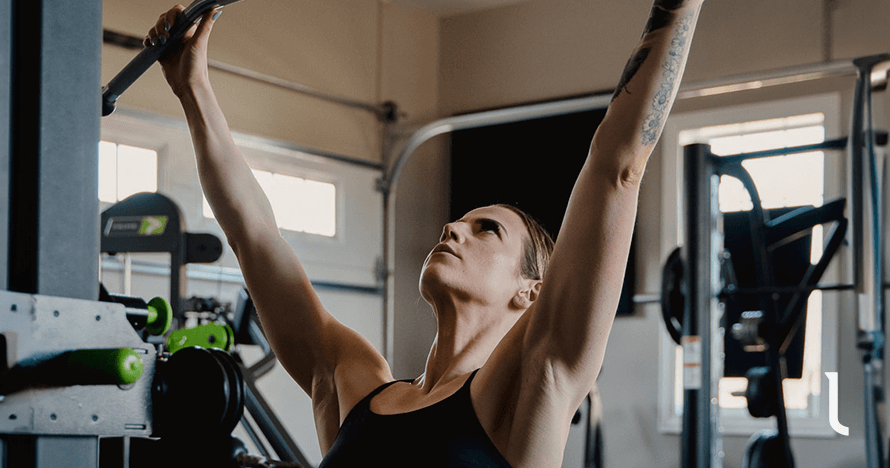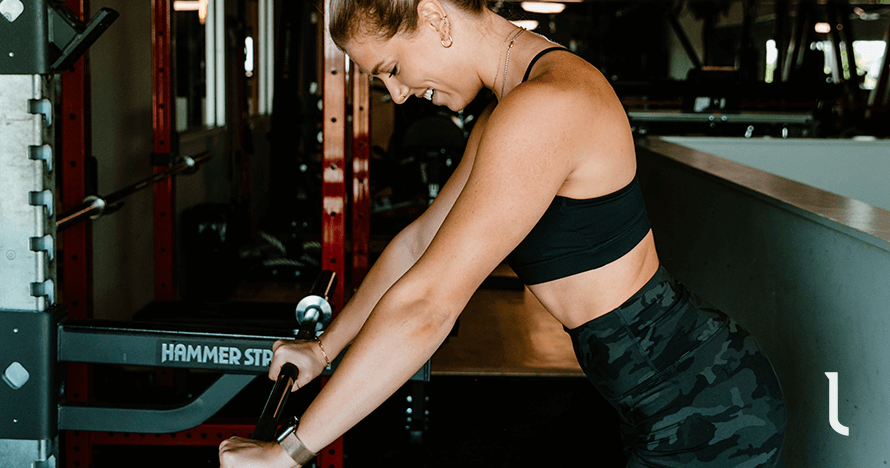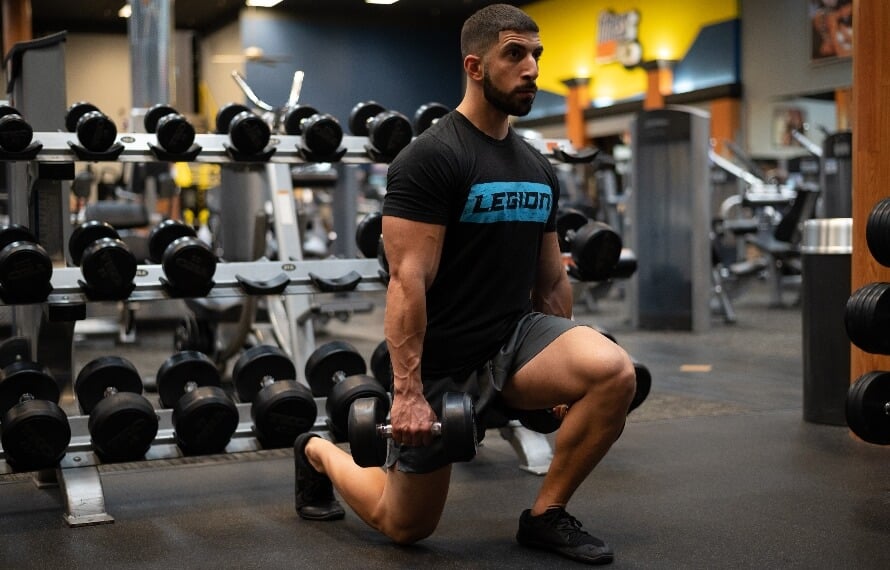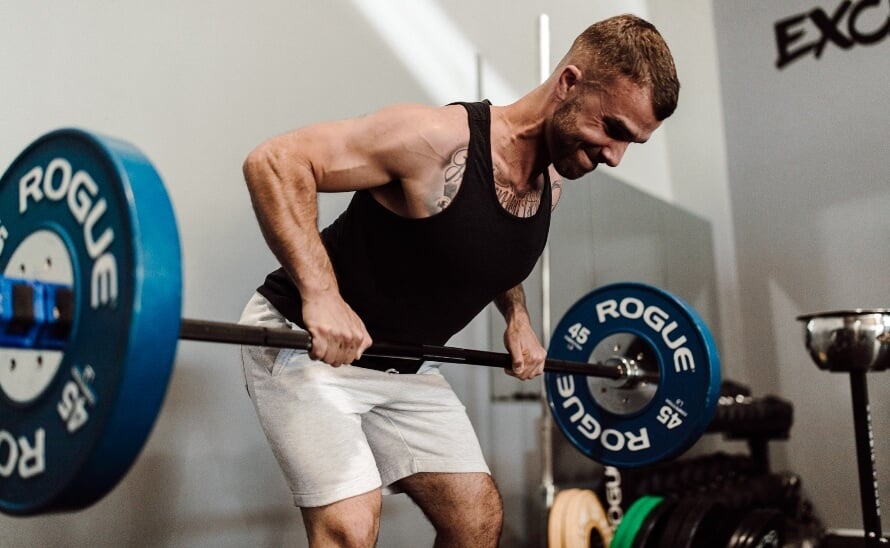It’s easy to miss the progress you’re making in the gym—especially when you’re your own worst critic. The subtle changes in your body can feel invisible, even as they add up over time.
Thankfully, there are clear, undeniable signs of gaining muscle and losing fat that can reassure you your hard work is paying off.
In this article, you’ll discover 9 unmistakable ways to tell if your efforts are working, how these signs differ for men and women, tips for tracking progress, and more.
Key Takeaways
- The clearest signs of gaining muscle and losing fat include getting stronger, seeing more muscle definition, and feeling your clothes fit differently (e.g., tighter around muscles like your arms or thighs and looser around your waist).
- More subtle signs you might notice include recovering faster from workouts or having more energy throughout the day.
- Men and women often experience these signs differently due to how they store fat and the exercises they prioritize, but the overall process is the same.
- To track your progress, weigh yourself daily, take measurements with body fat calipers and a tape measure, and take weekly progress photos.
- Most people notice signs of muscle growth within 6-to-8 weeks of consistent strength training.
9 Signs You’re Gaining Muscle and Losing Fat

The signs of gaining muscle and losing fat are easier to spot than you might think.
From getting stronger to noticing changes in how your clothes fit, these are the 9 clearest ways to know your hard work is paying off.
1. You Feel Stronger
One of the most obvious signs of muscle gain is that you’re lifting heavier weights and completing more reps in the gym.
Strength improvements also show up during day-to-day tasks—carrying groceries or climbing stairs might suddenly feel like less effort, for example.
2. Your Clothes Fit Differently
One of the clearest signs you are gaining muscle, not fat, is that your clothes fit differently.
For guys, shirts will feel tighter in the arms, chest, or shoulders as you build muscle, while your pants will feel looser around your waist.
Because men and women tend not to train in the same way, signs of gaining muscle for females might be slightly different.
For example, ladies probably won’t fill their shirts out like men, but they might find their pants feel snugger in the hips or thighs as their glutes grow and reshape, while their waistband will loosen as they lose fat.
3. Your Muscles Are More Defined
Being able to see greater muscle definition is an obvious sign of muscle growth. For instance, if you can clearly see separation between the different muscles in your quads, abs, or back, especially after workouts, you’re likely gaining muscle and losing fat.
4. Your Measurements Change
Measuring body parts like your biceps, thighs, chest, and waist provides a tangible way to see progress.
You know you’re gaining muscle when measurements in these areas increase. In contrast, your waist will become smaller when you lose fat.
5. Your “Before” and “After” Photos Look Different
Comparing progress photos can highlight changes you might otherwise miss in the mirror.
A leaner midsection, more defined muscles, or tighter-looking arms and legs are all “symptoms” of muscle growth and fat loss.
Taking photos every week using the same lighting and poses makes it easier to spot these changes and track your progress (more on this soon).
6. Your Workouts Feel Easier
Exercises that once felt incredibly taxing will become more manageable. You might also find you’re recovering faster between sets or finishing workouts in less time.
These are all signs you’re getting stronger, which is an indication you’re gaining muscle.
7. You Have More Energy
Building muscle and losing fat often come with a noticeable boost in energy.
Studies show that people who exercise to gain muscle and lose fat experience better mood, less stress and fatigue, and increase vitality, which collectively make you feel more energized.
8. You’re Less Tired and Sore After Workouts
At first, workouts might leave you limping around for days. Over time, though, that soreness fades faster, and you feel ready to hit the gym again sooner.
That’s your body adapting to the demands of training—a clear sign you’re gaining muscle and getting fitter.
9. You Get Compliments
It’s a great confidence boost when people start noticing your progress. When someone says you’re looking leaner or more muscular, it’s proof all your hard work is paying off.
Sometimes, you need that outside perspective to really see how far you’ve come.
Are The Signs of Gaining Muscle and Losing Fat the Same for Men and Women?
The signs of gaining muscle and losing fat are largely the same for men and women: you feel stronger, your clothes fit differently, and your muscles look more defined.
That said, the way these changes appear can vary slightly because of differences in how men and women store fat and train.
Let’s explore these differences now.
Signs of Gaining Muscle and Losing Fat for Females


While people often think women build muscle slowly, research shows they gain muscle just as quickly as men relative to their starting point. The misconception likely comes from the fact that women generally start with less muscle, so their absolute gains seem smaller.
What is true is that women typically gain muscle differently from men because of the way they like to train. Most women focus on lower-body exercises, so their glutes, quads, and hamstrings usually grow faster than their chest, shoulders, arms, and back.
When it comes to the signs of losing fat for females, the first changes often show up in your arms and shoulders. These areas store little fat, so as you slim down, your upper arms will tighten, and your shoulders will become more defined.
Your back will also change quickly. As you lose fat, the muscles near your shoulder blades and along your spine stand out more, creating a clear line down the center of your back.
Your hips and thighs—which tend to hold the most fat—are also some of the first areas to slim down. Many women notice their pants fit better even after losing just a few pounds.
Signs of Gaining Muscle and Losing Fat for Males


Men tend to see dramatic changes in muscle mass when they start lifting weights. They actually gain muscle at a similar rate to women, but because they usually start with more muscle, their results are often more marked.
Similarly to women, how men like to train affects their first signs of muscle gain. Most guys prioritize upper-body exercises, which means their chest, shoulders, and arms usually grow faster than their legs.
When it comes to fat loss, the arms and shoulders are often the first places to change. Veins in your forearms might start to “pop,” and your biceps, triceps, and shoulders will look more defined. You’ll also notice clearer separation between your shoulders and upper arms.
Your stomach tends to follow suit. Belly fat is usually the first to go when you lose weight, so your stomach starts to look flatter, a faint outline of your abs might show up, and your pants fit looser around the waist.
Your legs also lean out quickly. Men don’t store much fat in their thighs, so you’ll notice separation between your quad muscles early on. You might also find your thighs no longer rub together as much when you walk.
How to Track Muscle Gain and Fat Loss
Tracking muscle gain and fat loss doesn’t require fancy tools or complicated methods. Here’s all you need to do:
1. Weigh Yourself Daily
Weigh yourself every morning after using the bathroom and before eating or drinking. Write down your weight each day, and at the end of 7 days, add up the total and divide it by 7. This gives you your average weight for the week.
Watch those averages over time and you’ll be able to see if things are actually moving in the right direction or not.
2. Use Skinfold Calipers Weekly
Skinfold calipers are far from ideal for measuring body fat percentage, but they work well for tracking fat loss. If the measurements shrink, you’re losing fat. If they grow, you’re gaining fat.
Take three skinfold measurements:
- For women: Triceps, thigh, and suprailiac.
- For men: Chest, abdomen, and thigh.
For a more detailed guide to using bodyfat calipers, check out this article:
How to Use Skinfold Calipers to Measure Body Fat Percentage
3. Measure Your Waist Weekly
Measuring your waist at the belly button is one of the best ways to track fat loss. If your waist is shrinking, you’re losing fat. If it’s growing, you’re gaining fat.
4. Take Weekly Progress Photos
Taking pictures often helps you see the clearest signs of gaining muscle and losing fat.
Snap pictures from the front, side, and back in consistent lighting every week. Over time, these photos will make it easy to see the changes that other tools might miss.
FAQ #1: How do you know if you’re gaining muscle?


The clearest signs you’re gaining muscle include lifting heavier weights, completing more reps, and noticing changes in how your body looks and feels. Your muscles will become more defined, your clothes will fit differently, and your measurements will change.
Weekly progress photos can also highlight changes you might miss in the mirror.
FAQ #2: When can you tell you’re getting bigger muscles?
Most people notice signs of muscle growth within 6-to-8 weeks of consistent strength training. They feel stronger in the gym, notice their clothes fit differently, and will be able to see more muscle definition in the mirror.
FAQ #3: Is fatigue a sign of gaining muscles?
Feeling tired after tough workouts is normal, but fatigue by itself isn’t a reliable sign of gaining muscle. If you constantly feel drained, it could mean you’re overtraining or not recovering well.
Better indicators of muscle growth are lifting heavier weights, noticing your clothes fit differently, and seeing visible changes in your body. Focus on those instead of how tired you feel.
Scientific References +
- Wender, Carly L. A., et al. “The Effect of Chronic Exercise on Energy and Fatigue States: A Systematic Review and Meta-Analysis of Randomized Trials.” Frontiers in Psychology, vol. 13, no. 13, 3 June 2022, https://doi.org/10.3389/fpsyg.2022.907637.
- Abe, Takashi, et al. “Time Course for Strength and Muscle Thickness Changes Following Upper and Lower Body Resistance Training in Men and Women.” European Journal of Applied Physiology and Occupational Physiology, vol. 81, no. 3, 2000, p. 0174, link.springer.com/article/10.1007/s004210050027, https://doi.org/10.1007/s004210050027.
- Karastergiou, Kalypso, et al. “Sex Differences in Human Adipose Tissues – the Biology of Pear Shape.” Biology of Sex Differences, vol. 3, no. 1, 2012, p. 13, www.ncbi.nlm.nih.gov/pmc/articles/PMC3411490/, https://doi.org/10.1186/2042-6410-3-13.



